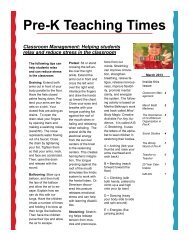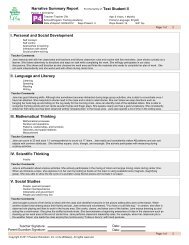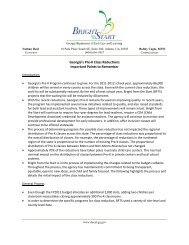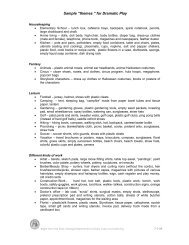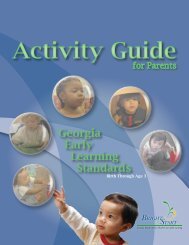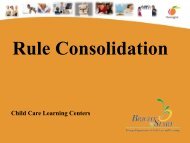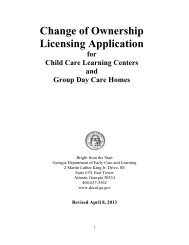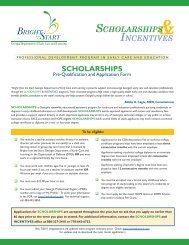Georgia's Pre-K Program - FPG Child Development Institute ...
Georgia's Pre-K Program - FPG Child Development Institute ...
Georgia's Pre-K Program - FPG Child Development Institute ...
Create successful ePaper yourself
Turn your PDF publications into a flip-book with our unique Google optimized e-Paper software.
2 Georgia Study of Early Care and Education: Findings from Georgia’s <strong>Pre</strong>-K <strong>Program</strong><br />
In 2008–09, <strong>FPG</strong> conducted a statewide study of randomly selected Georgia’s <strong>Pre</strong>-K<br />
programs and licensed child care centers, collecting data on the observed classroom<br />
quality and characteristics of these programs. The current report describes the overall<br />
study and summarizes findings from Georgia’s <strong>Pre</strong>-K classes in schools and child<br />
care centers. Findings about infant, toddler, and preschool classrooms (other than<br />
Georgia’s <strong>Pre</strong>-K) in child care centers can be found in a companion report, Georgia<br />
Study of Early Care and Education: <strong>Child</strong> Care Center Findings.<br />
Study Description<br />
The primary purpose of this statewide study of pre-k and child care was to gather<br />
data regarding the range of quality across Georgia. Generally, the study was designed<br />
to describe (a) the quality of center-based care and pre-k programs; and (b) types of<br />
services provided to infants, toddlers, and preschoolers served by these programs.<br />
This section describes the methods used for the entire study, but this report focuses<br />
solely on findings from Georgia’s <strong>Pre</strong>-K in child care centers and schools.<br />
<strong>Program</strong> Selection<br />
The sample of programs that participated in the study was selected to address the<br />
study’s primary purpose: estimating the quality of care provided across licensed<br />
centers and Georgia’s <strong>Pre</strong>-K. Data were collected in 173 programs. A sample size of<br />
173 was determined to have an adequate balance of precision and feasibility, where<br />
the mean score on the main quality measures in the sample is within ±.12 ECERS–R/<br />
ITERS–R points of the population mean.<br />
To select the sample, DECAL provided a list of all licensed child care centers (including<br />
those that do and do not participate in Georgia’s <strong>Pre</strong>-K <strong>Program</strong>) and school-based<br />
Georgia’s <strong>Pre</strong>-K programs. <strong>FPG</strong> randomly selected programs to be recruited for<br />
participation in the study. A simple random selection process was used (i.e., no<br />
stratification), and programs were spread throughout the state.<br />
During recruitment, programs that declined or were determined to be ineligible were<br />
replaced by additional randomly selected programs from that same list. To achieve<br />
the final sample of 173, we contacted 342 programs. Thirty-four were determined<br />
to be ineligible (e.g., no longer served children, no longer licensed) and 135 declined<br />
to participate. Thus, the overall response rate was 56% (173 participants / 173<br />
participants + 135 declined). The response rate varied by program type, with 48%<br />
of licensed centers agreeing to participate (112 out of 235) and 84% of schools with<br />
Georgia’s <strong>Pre</strong>-K agreeing to participate (61 out of 73). These response rates are similar<br />
to that of multi-state studies of child care (52% in the Cost, Quality, and Outcomes<br />
Study) 10 and pre-kindergarten (78% in the Multi-State Study of <strong>Pre</strong>-Kindergarten). 11








